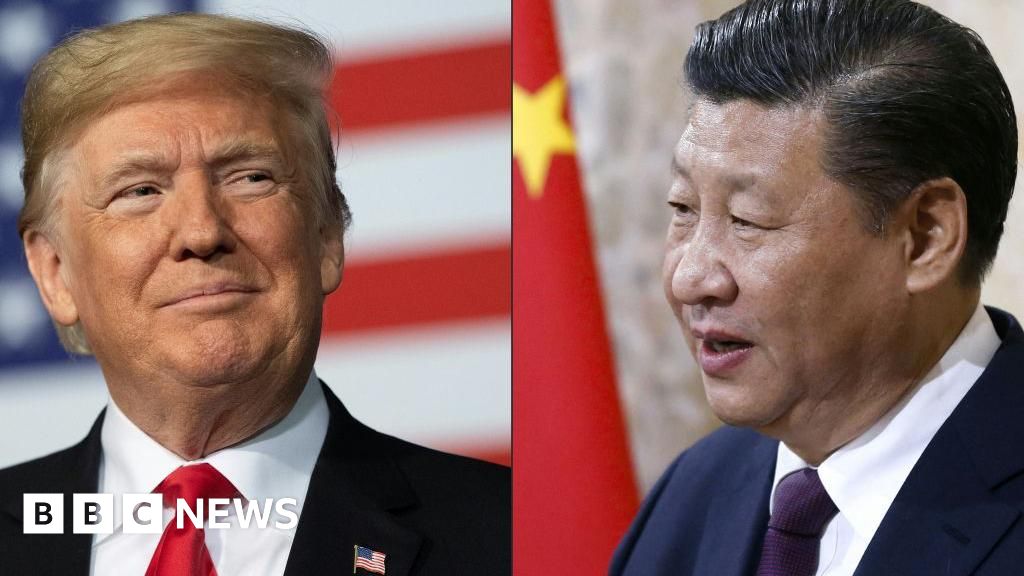Navigating Tensions: Will US or China Compromise First in Trade Talks?










2025-05-02T00:06:21Z

In a significant development that many have been anxiously anticipating, a spokesperson from China's Ministry of Commerce announced on Friday morning that Beijing is currently evaluating the possibility of initiating tariff negotiations with the United States. This statement comes at a crucial time when trade relations between the worlds two largest economies are strained by extraordinarily high tariffssome reaching as much as 245% on certain Chinese exports to the US. Such tariffs not only freeze trade but also raise concerns about a potential recession affecting both nations and beyond.
The spokesperson's remarks to reporters stated, "US officials have repeatedly expressed their willingness to negotiate with China on tariffs." However, they emphasized that Chinas position remains clear: "If we fight, we will fight to the end; if we talk, the door is open. If the US wants to talk, it should show its sincerity and be prepared to correct its wrong practices and cancel unilateral tariffs." This statement came just a day after a Weibo account associated with Chinese state media claimed that the US had been looking to initiate discussions. This was shortly after President Trump suggested that talks were already taking place, a claim Beijing firmly denied.
A post from the Yuyuantantian account, connected to China Central Television (CCTV), asserted, "China has no need to talk to the United States." This statement highlights the back-and-forth nature of the current situation, where both countries are caught in a cycle of affirmations and denials, each unwilling to publicly take the lead in diplomatic discussions. The crux of the matter is not whether talks will occur but under what conditions, when, and who will take the first step towards dialogue.
The ongoing tension has been likened to a high-stakes game of chicken between President Trump and Chinese President Xi Jinping, as both leaders strive to maintain their reputations while covertly seeking a mutually beneficial resolution to the trade war. Political science expert Ja Ian Chong from the National University of Singapore noted, "I expect some of this back-and-forth, because neither Washington nor Beijing wants to look like they are the side that's giving in. A de-escalation would benefit both sides, hence the overarching incentive to proceed with caution."
Wen-Ti Sung, an academic affiliated with the Australian Centre on China in the World, elaborated on this competitive dynamic. "It's like two race cars speeding towards each other; whoever swerves first will be viewed as the weaker party. Neither side wants to appear soft at this point." The leader who first admits to initiating tariff talks risks losing credibility and bargaining power, which is a significant concern for both parties.
This peculiar deadlockwhere both sides desire the same outcome yet hesitate to suggest it firsthas led to a strategy known as "constructive ambiguity." This approach involves using vague language that allows each side to claim a sense of righteousness in their position. Sung posited that the Weibo post from Yuyuantantian could be interpreted as China exploring ways to establish an avenue for de-escalation without losing face.
One effective way to break this impasse might involve a neutral third party stepping in to mediate and facilitate discussions, providing a clear off-ramp for both China and the US. Alternatively, a broader interpretation of what it means for "the other side to reach out" could help reconcile the situation. In this context, the first side to engage in talks could still frame it as a reaction rather than an initiation, thus preserving their self-image. For both Trump and Xi, this could allow the commencement of tariff negotiations while each leader can still claim a form of victory.
The perception of winning at home is crucial for both leaders. As Chong highlighted, de-escalation is desirable, but both Trump and Xi must also deliver tangible successes to their domestic audiences. Trump is keen on demonstrating that he has compelled Beijing to yield, while Xi seeks to show that he has successfully encouraged a more reasonable approach from the US.
Domestically, both leaders are contending with the economic repercussions of the trade war. Recent economic data indicates that the US economy contracted in the first quarter of the year for the first time since 2022, raising alarm about a potential recession. Meanwhile, Xi faces his own set of challenges as he combats low consumer confidence, a real estate crisis, and rising unemployment; he must reassure the Chinese populace that he can effectively navigate the trade war and support a recovering economy in the aftermath of the pandemic.
As Sung noted, both leaders now understand that a clear-cut victory is unlikely. Trump is reportedly aware that he won't achieve all his desired outcomes, so he is seeking a point of concessionone that allows him to claim a slight victory for domestic purposes. Conversely, while China is open to negotiations, they are also keen on determining an appropriate price point for any concessions.
Sung characterized the current situation for Xi as a "two-level game." He explained that China must manage bilateral discussions with the US while simultaneously maintaining a narrative of rising power domestically. "A perceived capitulation of the East to the West undermines the narrative of the Easts ascendance," he stated.
While the United States has yet to publicly deny China's claims of seeking talks, the concurrent assertions from both sides suggest that some form of dialogue is indeed occurring. Chong remarked, "The two sides are talking, which is a positive sign indicating the potential for some form of accommodation." However, he cautioned that the resumption of negotiations does not imply that the historically fraught US-China relationship is on the mend. The ongoing posturing indicates that neither party has reached a point where they are genuinely seeking a resolution. "Each side likely hopes for concessions from the other, resulting in a standoff until one side ultimately blinks first."
 Lars Andersen
Lars Andersen
Source of the news: BBC News